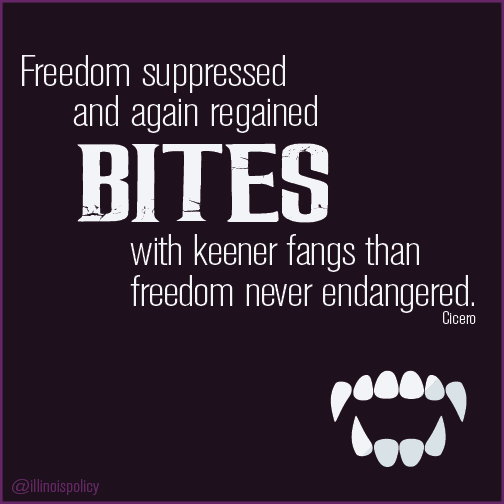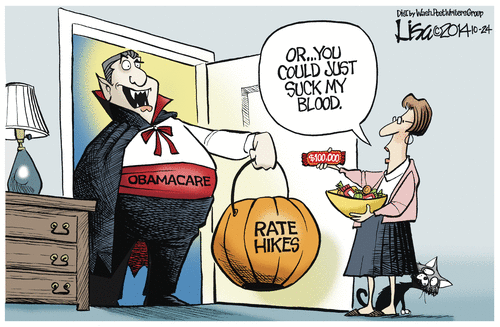QUOTE OF THE DAY
Daily Herald: Sleepy Hollow voters asked for 82 percent property tax increase
Are voters in the tiny bedroom community of Sleepy Hollow ready for an 82 percent increase in the property taxes they pay?
They’ll decide Nov. 4 whether to approve a property tax increase nearly doubling what they now pay. The village is seeking to collect an additional $478,571 yearly from its more than 3,300 residents.
Wall Street Journal: Charter School Boasts Big Pay and Big Results
A small New York City charter school opened five years ago with an attention-grabbing premise: Paying teachers $125,000 salaries would lure ace faculty and help poor children learn.
A new study of the middle school, called The Equity Project, suggests that the experiment is working. The report to be released Friday by Mathematica Policy Research said the school’s students made more progress than similar children attending traditional city schools.
After four years at the charter school, eighth-graders showed average test score gains in math equal to an additional year and a half of school, compared with district students. The study found these charter students’ gains equaled more than an extra half-year in science and almost an extra half-year in English.
The Blaze: Double Trouble for the Health Care Overhaul?
As President Barack Obama’s administration gears up for its second open enrollment period next month, the president’s health care overhaul is now facing two new threats. Either piece of news, on its own, should warrant concern from the law’s most ardent supporters for the program’s long-term prospects.
The first threat is a group of legal challenges to the law that are making their way through the courts. At issue is what the plain text of Section 1401 of the Affordable Care Act means. Even though the text of the law states that the subsidies are available “through an Exchange established by the State under 1311 of the Patient Protection and Affordable Care Act,” the Internal Revenue Service (IRS), without congressional authorization, allowed federal subsidies to flow into states participating in the federal exchange when it implemented the law.
At present there are four legal challenges that are based on this issue. In one case, State of Indiana v. IRS, oral arguments were heard in federal district court earlier this month. In the King v. Burwellchallenge, the 4th U.S. Circuit Court of Appeals upheld the legality of the IRS subsidies.
USA Today: Reno finds Medicaid expansion a tough hand to play
For Carolyn Oatman, enrolling in Medicaid this year was “a dream come true.”
Uninsured since she lost her job five years ago in this desert gambling city, Oatman, 57, often couldn’t afford the drugs to control her asthma and high blood pressure. She would sell her blood plasma to scrape together enough money to see a doctor.
Since she signed onto Medicaid, her care is free, including her medicines. But there’s a downside: It can take two months to get a doctor’s appointment at a community health center, or it’s an all-day wait if she just shows up.
Chicago Tribune: 1st phase of $719 million Tri-State, I-57 interchange opens
The opening of the first phase of the new $719 million interchange connecting the Tri-State Tollway (Interstate 294) and I-57 in the southwest suburbs near Markham took place Saturday.
A dedication ceremony featuring Tollway and Illinois Department of Transportation officials, Gov. Pat Quinn and local leaders was held on the flyover ramp connecting the two highways.
With completion of the initial phase, the interchange provides access from northbound I-57 to northbound I-294 and from southbound I-294 to southbound I-57, including a new interchange at 147th Street, officials said.
Real Clear Policy: Beyond the ‘Private Option’ for Medicaid Expansion
Less than a year after low-income Arkansans started receiving health coverage under the Affordable Care Act’s controversial Medicaid expansion, the state is declaring its so-called “private option” experiment a success.
Hospitals saw fewer uninsured patients, state coffers were spared millions in health care costs and private insurers reported record-low premium hikes. Most important, Arkansas’ uninsured rate fell from 23 percent to 12 percent, the sharpest drop in the country.
But lawmakers in Arkansas, where Gov. Mike Beebe is a Democrat and the legislature is controlled by Republicans, have already asked the federal government for adjustments to their groundbreaking plan, under which Arkansans used Medicaid dollars to purchase private health insurance on the insurance exchange created under the ACA. Meanwhile, other states are customizing their own alternative approaches to expanding Medicaid to cover adults with incomes up to 138 percent of the federal poverty level ($16,105 for an individual).
Chicago Tribune: CTA bomb screening is a waste
Today’s announcement that Chicago police will start screening bags at CTA stations for explosives is one of those instances where the people in charge of our safety are trying to make us feel safer while actually achieving little or nothing — and, in fact, making us less safe.
A team of up to six officers will stop patrons at random, swab their purses, backpacks and other items, and then do tests for explosive materials. What is this supposed to accomplish? The chances that random checks will find a terrorist on a rail system that carries 726,000 passengers per day is minuscule. So the program is highly unlikely to catch anyone — or even deter anyone.
It will, however, take several cops away from places where the chance of a violent death is far higher. Every officer swabbing bags is one who is not patrolling Englewood or Avondale. The L can be unsafe, but these teams aren’t likely to stop the usual crimes because the cops won’t be on platforms or trains.
Bloomberg: Love Your Country, Reform Its Tax Code
Whichever party is in the majority in the House and Senate after the November elections, the next Congress should make repairing our broken tax code a bipartisan priority.
That fix must be comprehensive; more tinkering won’t work. Last month, Treasury Secretary Jack Lew unveiled proposed regulations intended to bring an end to so-called inversions — which allow a U.S.-based company to change its address to a foreign country to avoid our high tax rates and escape our uncompetitive tax code. Rather than addressing the flaws in our tax system that drive our companies overseas, the new regulations try to hem businesses into an outdated system that includes, at 39 percent for combined federal and state taxes, the highest statutory corporate rate among the developed countries. Worldwide, only the United Arab Emirates and Chad have higher rates.
CARTOON OF THE DAY

